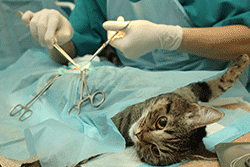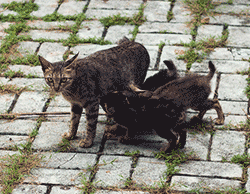Spaying, castrating & neutering
The importance of neutering cannot be underestimated. With the exception of intentional breeding, cats should always be neutered

Also known as fixing, spaying or neutering is done to prevent cats from reproducing. There are many reasons for doing this but the most important is to prevent more unwanted cats and kittens entering an already too-high cat population. If your cat is a male and he successfully mates with a female, you have no control over what happens to the mother and its kittens. In many cases the mother is driven away by other males, and the kittens are either poorly cared for, become feral, disposed of, or given to unsuitable owners.
If your cat is a female and you allow it to become pregnant then you have caused your cat undue stress and you have a responsibility to care for the kittens and locate suitable homes. Once you have given the kittens away, you have no control over their lives, and the statistics do not favour a long and happy life.
What exactly is spaying, castrating, or neutering?
Neutering (from the word neutral), means neither sex, and is essentially the same as 'fixing'. A fixed cat is one which has been neutered. In males the process of neutering is castration, whilst in females it is spaying.
Castration (males)
The operation for castration involves the removal of both testicles through incisions to the scrotum. The operation is done under general anesthetic and the cuts are very small. The kitten can normally go home the same day.
Spaying (females)
The operation for spaying is a bit more involved than castration and involves the removal of the uterus and ovaries through an incision on the belly. As with castration, a kitten can normally be sent home the same day, although they will need a bit more monitoring over a few days whilst healing takes place.

There are too many stray and unwanted cats on the streets
Un-neutered male cats
A male which has not been neutered is likely to spend long periods of time, often days, away from home in search of females. During this extended leave, he is likely to become involved in fights as well as potentially mate with several females. Apart from creating unwanted litters, all the extra contact will dramatically increase your cats chances of becoming wounded and develop all sorts of health problems. When your un-neutered male is indoors, he will probably start spraying urine (marking) as well as increase scratching and show aggressive tendencies.
Un-neutered female cats
Whilst they do not show the same level of 'problem behaviours' as males, females can also be problematic and are likely to start 'calling' when they are in season, which can be quite noisy. If she comes into contact with males it is likely she will become pregnant. Females can have up to three litters a year and up to eight kittens each time, and those kittens can breed within a few months. Potentially, one un-neutered female can be responsible for thousands of cats. An un-neutered female is much more likely to develop health problems such as infections or viruses passed on through biting during mating.
Arguments against fixing
There are a few beliefs against fixing, most of which have no basis in fact. Number one amongst these is simply that it is cruel and taking something away from the cat, however this is really applying human values to a feline situation. Cats, like most animals, do not have a sense of sexual identity, so a fixed male will not feel 'less of a man' and a female will not feel 'less of a woman'. These are human attributes. On the contrary, fixing will prevent cruelty by removing potentially harm-inducing situations and prevent kittens being born destined for a less than ideal life.
Cost:
Fixing is relatively cheap to perform, and if you can't afford fixing, then you can't afford a cat.
Should females have one litter first?:
There is no medical evidence to suggest that females do better if they are allowed one litter.
Will my cat change personality, or become lazy?:
No, your cat's personality will not change, but it may become less aggressive and more content.


















